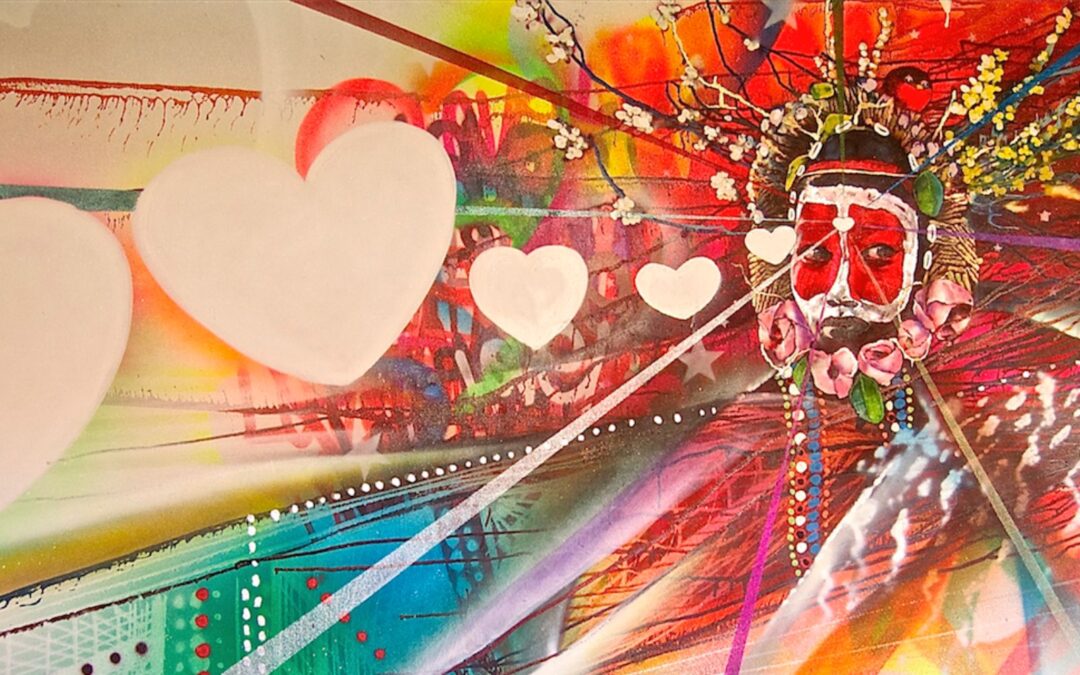by, Elizabeth Bast, Cofounder of SoulCentro
*Iboga-inspired art by Chor Boogie Nima Gnyangou
To best prepare our spirit for Iboga, we start by relating to Iboga as a spirit—rather than just a medicinal substance to consume. For there is a spiritual intelligence in the plant teacher—just as there is a spiritual intelligence within ourselves.
The Iboga plant medicine is a benevolent and highly intelligent spirit, far older than human beings. It is an ancestor that watched human beings grow into what we are over eons, as it bioengineered itself in profoundly specific ways to heal and support us in mind, body, and soul. That is not for you to believe, but to experience for yourself.
From our vantage point at SoulCentro from hundreds of Iboga retreats, we see that the way we come to the medicine is just as important as the medicine itself. When it comes to Iboga preparation, the medicine gives equivalent to what we give to the experience.
Intentional preparation for Iboga is one way to show respect to the medicine spirit, the Bwiti tradition, and the ceremony. It is also vital for creating the greatest possible safety.
To further support Iboga preparation for all our retreat guests, we also provide our signature Preparation Playbook, a one-on-one Bwiti counsel session, and a one-on-one medical and psychiatric consultation session prior to arrival.
*This list is not meant to be a protocol for a DIY treatment. Iboga should only be taken with a qualified therapeutic guide. As one indigenous Bwiti friend said: “Taking Iboga without a qualified guide is like driving while blindfolded.” Additionally, Iboga treatments require comprehensive medical screening and 24/7 medical support.
Here are our top essential tips for preparing the spirit for Iboga:

CREATE INTENTIONS & RELEASE EXPECTATIONS
Creating clear intentions are a way to honor the medicine experience as well as get the most out of it. If we are in a place of confusion or uncertainty, our intention can even be to discover our highest intention. Intentions are like the sail on a boat, helping to guide us through our journey while being open to the direction and course that the medicine needs to take us. The key to intention is that one must mean it 100%.
Expectations, on the other hand, can be rigid, effectively creating obstacles for what the medicine is trying to show us in the moment. While expectations arise unconsciously for every human being, we can practice (not perfect) releasing and remaining aware of them.
Iboga knows each of us more intimately than we know ourselves, and it creates a perfect curriculum for each person. For example, if someone comes to Iboga wanting creative ideas for their new business, they might instead need to heal core trauma wounds and patterning in order to create spaciousness for those desired ideas to land from an authentic place.
Initially, people often need to have a big mind-body-soul detox, which can be uncomfortable. During the detox phase, we are “purging” and there might not be clear insights yet. There may or may not be visions—or if visions do present, they can be chaotic and bizarre. Everyone needs to detox for some amount of time when first encountering Iboga, and this does not only apply to people in recovery from substance abuse.
During the journey, it is helpful to practice being present and engaged with what is, rather than clinging to attachments around what we think should happen. It’s the same for all good relationships. Nobody likes to be choked by expectations and attachments. Curiosity, attentiveness, and responsiveness are the food of love, including the love we can have with Iboga.
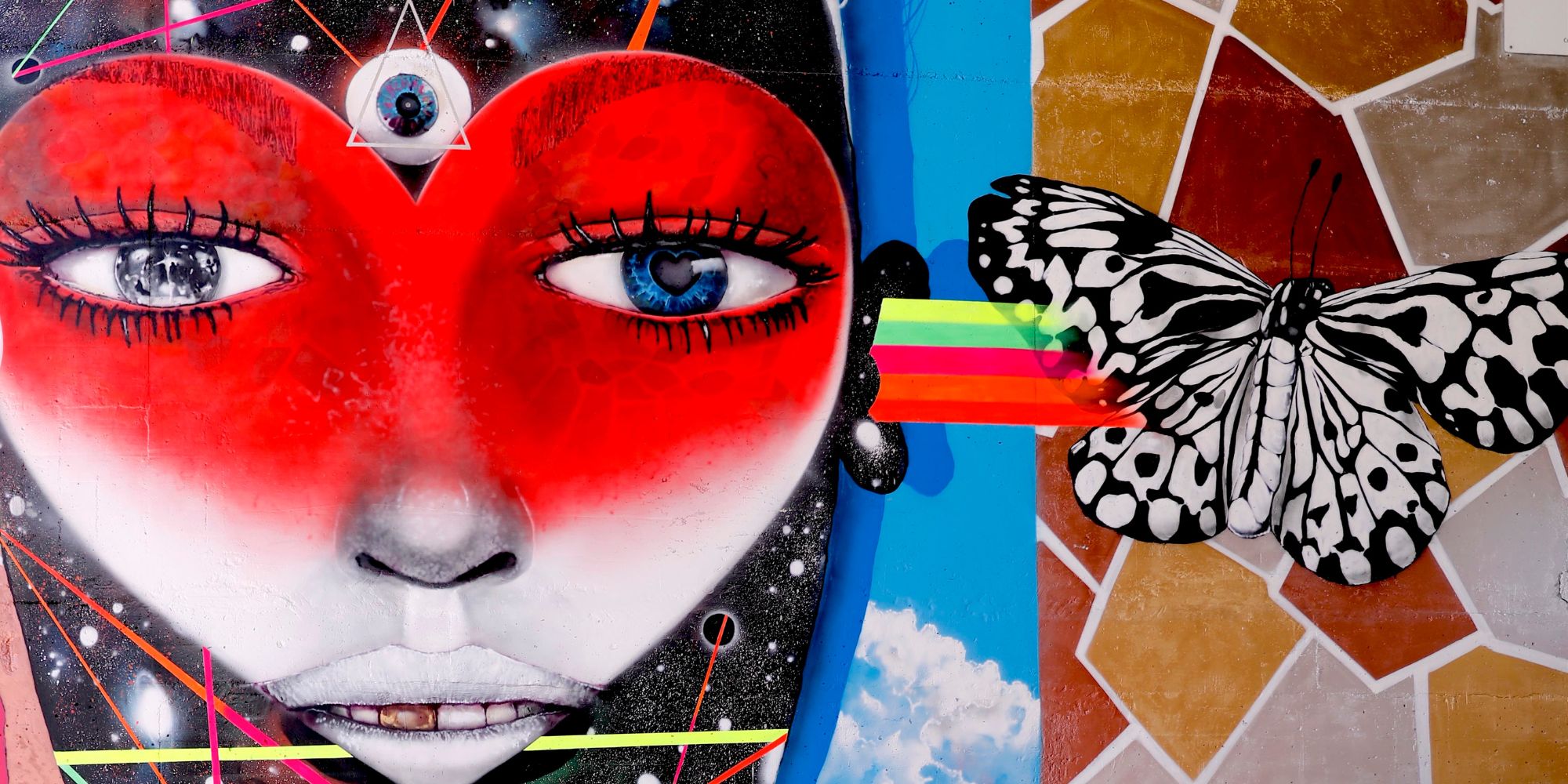
BEGIN A DIALOGUE WITH THE SPIRIT OF IBOGA
As traditional Bwiti practitioners, we come with respect in the heart for this profound spirit that we have called in. We can begin speaking and listening to Iboga, in subtle ways. This dialogue can be about asking for specific kinds of help, but also stating what we would like to give back.
Coming to Iboga means entering into a relationship. Like all relationships, it is based on true reciprocity: the giving and receiving gifts. Iboga has exquisite gifts for us, but what gifts are we offering to Iboga?
We humans can offer our devoted attention, willingness, trust, patience, respect, service to the earth, artistic creations, love, and much more. Let it flow from your heart.
The dialogue can be during quiet moments of meditation, walking through nature, or other spiritual practices. The liminal times of waking and drifting to sleep are also fertile windows in consciousness to explore this conversation. The Bwiti say that “the spirits love sound,” so we can literally speak out loud as well.
After speaking, we can then listen closely. If we aren’t accustomed to this kind of deep listening, it can take time to discern the voice of the spirit vs. the voice of our own trauma-riddled mind. We can remain steadfast, listening with patience and openness.
Many guests comment that they feel the medicine subtly working and offering guidance from far away, both in waking moments as well as in dreams. This can also manifest as emotional and psychological material coming to the surface for deeper examination and release.
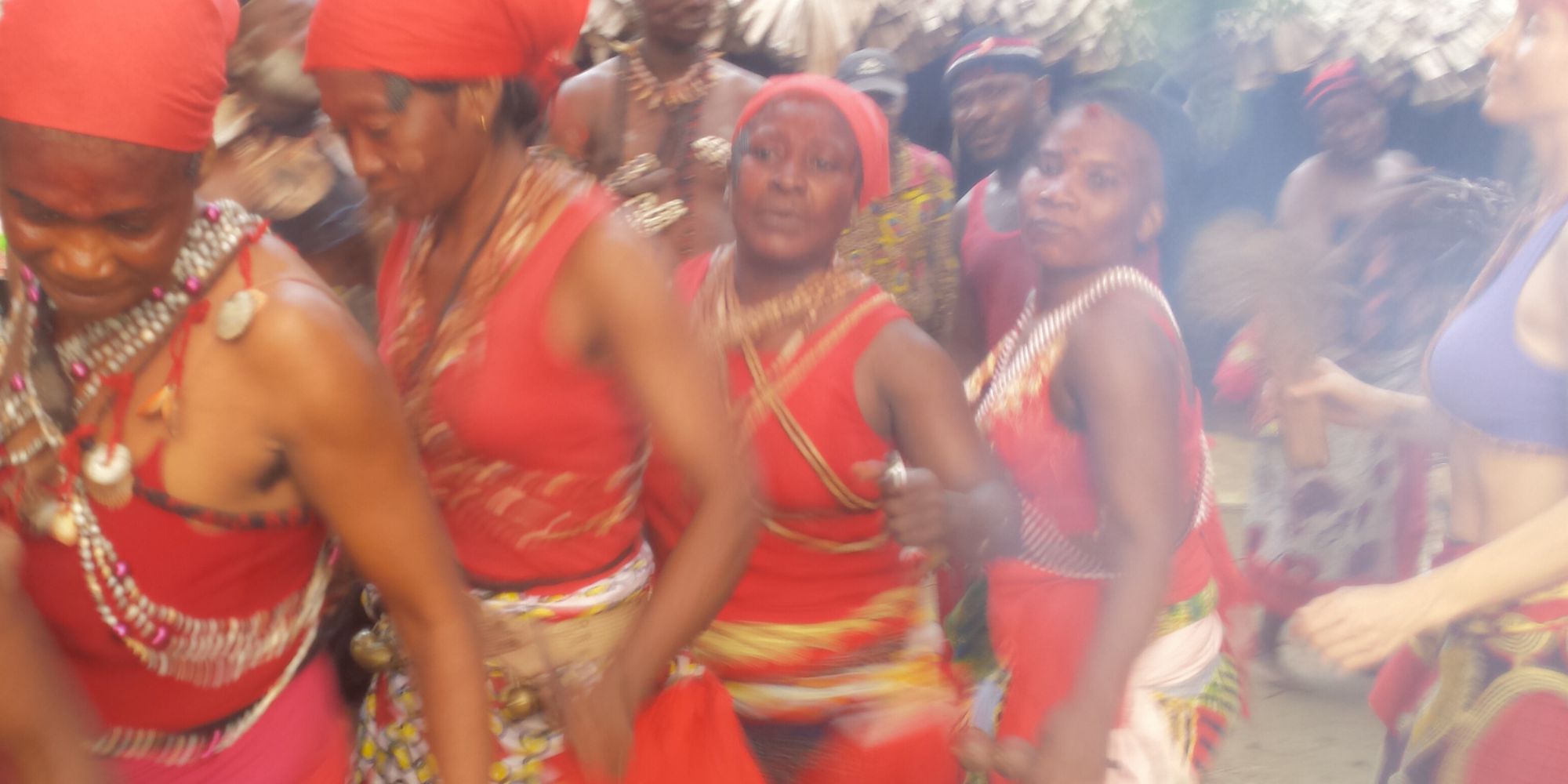
UNDERSTANDING BWITI
The Missoko Bwiti tradition is not a religion. Rather, it is a tradition that is simply the study of life, which is never-ending and based on direct experience.
In the Bwiti temple, there are three walls, and one wall is left entirely open. This is is significant, as it means that anyone is can come at any time, and anyone can go at any time. There is no obligation. Personal choice and sovereignty are core values of the Bwiti.
The Bwiti differentiate between beliefs and knowing, and seek to study the “art of knowing.” Beliefs can be changed as easily as clothing, whereas knowing is unbreakable. No one will ask you to believe anything in the Bwiti, for you must know for yourself. The oral tradition simply offers clues left by those who have walked the path before us. All voices are important in the Bwiti, and everyone has something to teach.
The Bwiti practice being in reverent and reciprocal relationship with all spirits of nature. Everything in nature holds sacred teachings and powers for us to learn from. There is one simple law in the Bwiti which contains thousands of laws: Don’t abuse nature, or the price is (ultimately) misery. And each of us is nature, too. This law can be verified by direct experience.

LEAVE OTHER TRADITIONS & THERAPEUTIC MODALITIES AT THE DOOR
*Iboga-inspired art by Chor Boogie Nima Gnyangou
Practice consciously leaving other modalities and traditions at the door to make way to experience this new medicine experience and indigenous way of knowing. This can be difficult for people who are steeped in dogmas around a particular spiritual tradition or therapeutic modality.
With much respect to other traditions and modalities, this medicine experience is utterly unique, especially with regards to the healing of trauma. Here, we respect the Bwiti tradition and how it holds Iboga, for it has evolved over many lifetimes to support the medicine experience. The Bwiti counsel is based on channeling guidance from the medicine, sharing truthful observations, asking clear questions, and supporting each person to hunt the truth for themselves.
While other traditions and modalities may be helpful in other contexts, they will not be helpful or appropriate in this unique experience.
When you leave other modalities and traditions at the door, you can always pick them up again on your way out.
Furthermore, many people come wanting help from Iboga that they have not yet received from other traditions or modalities. Thus, it’s wise to be willing to be willing (not perfect) to fully receive the medicine in all forms that’s being offered, for the greatest possible benefit.
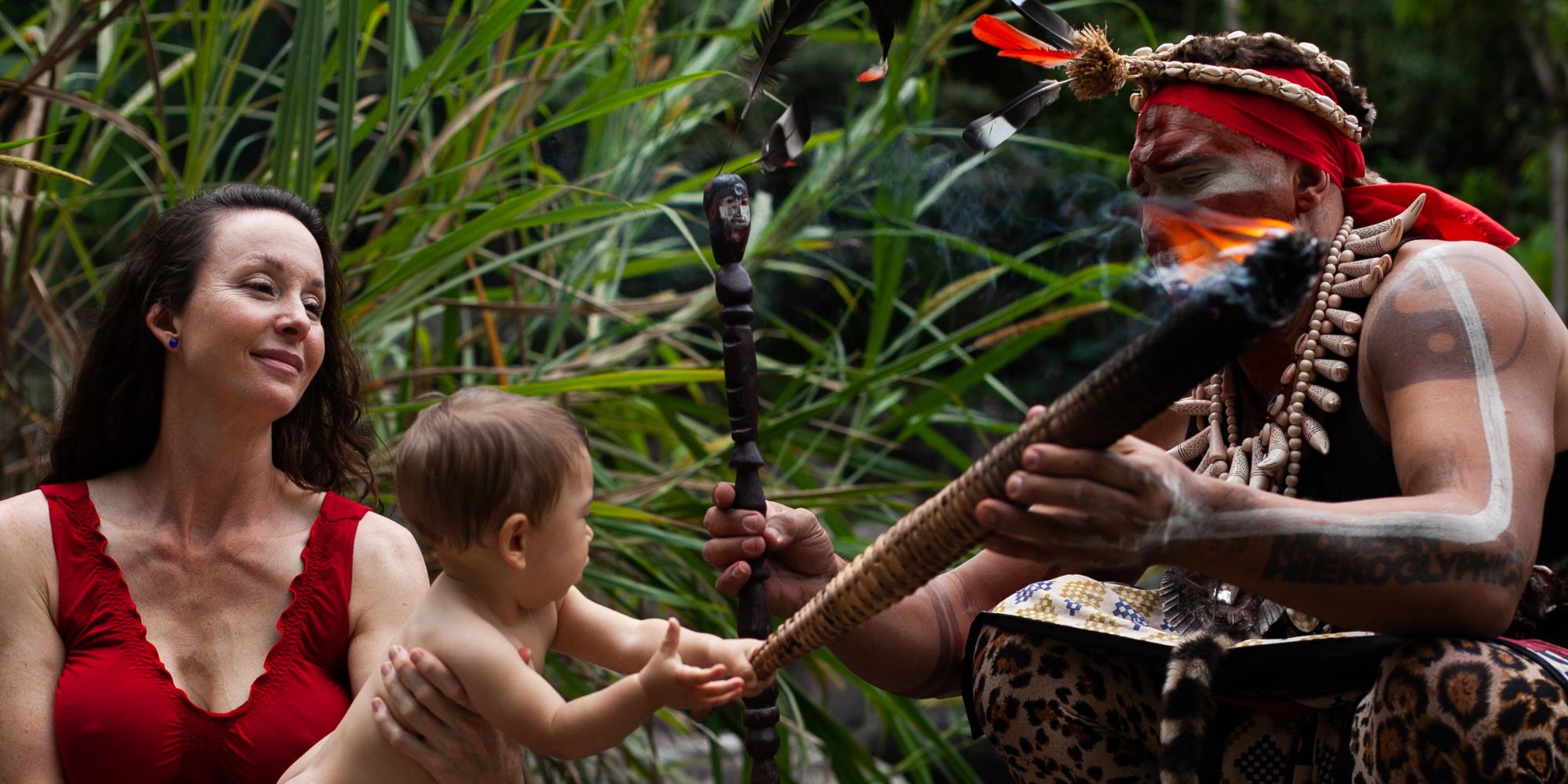
YOU ARE THE MODALITY
*Photo by River DeLieto
Iboga is not a “magic happy pill.” Iboga is a sacred opportunity for us to face and heal ourselves. It doesn’t take the steps for us, but it will show the way and support us enough to make the journey. We fare best by practicing reverence and gratitude for the Iboga teacher. Just as you have some kind of expertise—and you work best when people come with reverence and gratitude when they want your help.
Iboga is truly a rite of passage for our consciousness. Iboga brings us into a profound state in which we are ripe for change, but it is we who must actively change. Iboga works with our own choice to let go of the past that no longer serves us and to practice new ways of being.
Iboga is not here to control human beings. Iboga is here to support our maturation of consciousness, and thus it is only by freedom of choice that this evolution can happen.
Iboga itself is not the modality. Iboga is the divine rocket fuel, and you must drive the ship to your destination. As Nima Gnyangou says: You are the modality.
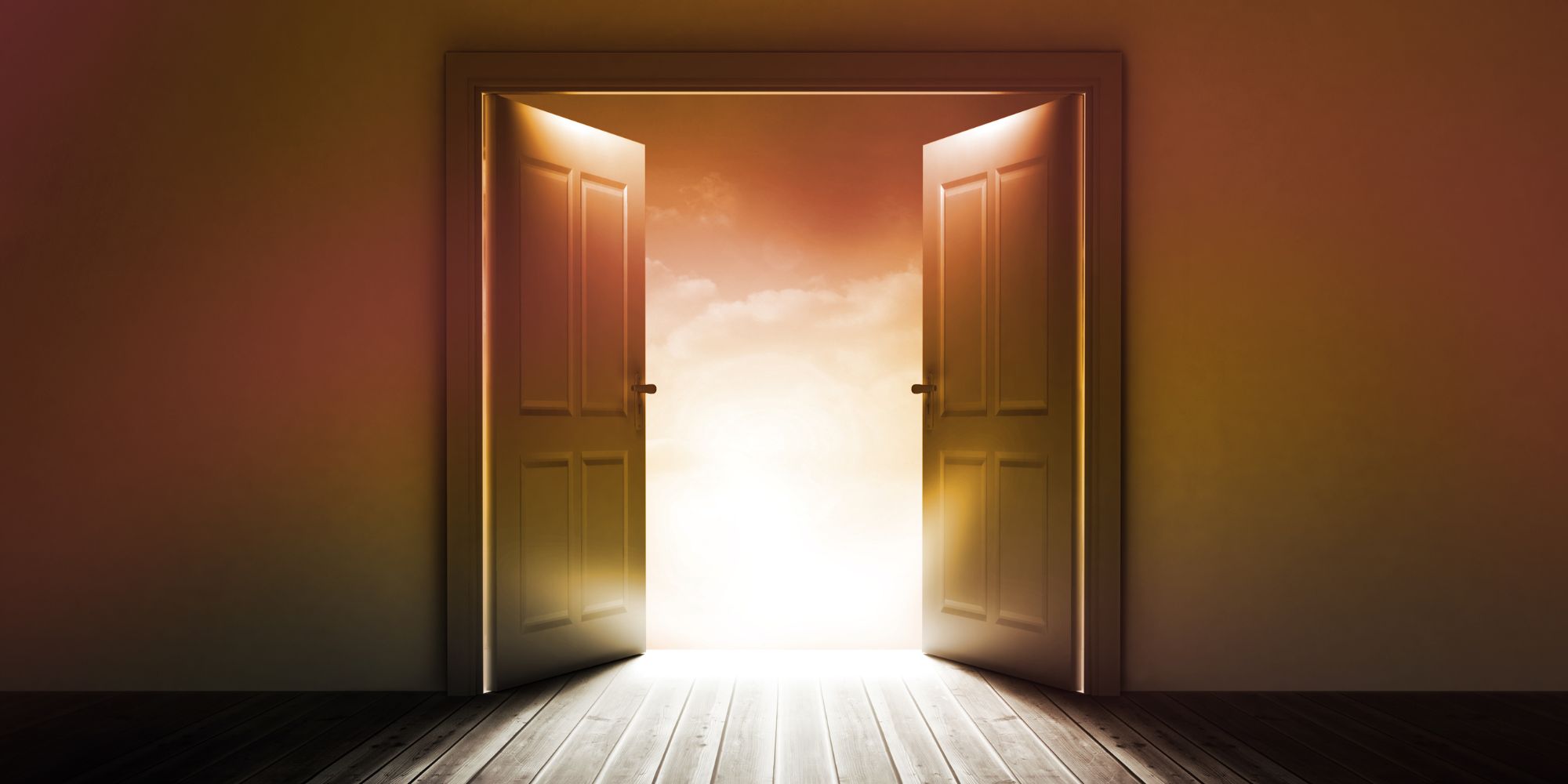
OPEN EVERY DOOR FOR IBOGA
We like to say that “we cannot invite medicine to only clean one room in our house.” This means that we can’t just ask Iboga to fix one problem for us while leaving other toxic habits. All of our wounds are interconnected and interrelated.
Invite the medicine into every room of the house that is you, to heal everything that needs healing. Open the doors wide. Still, there is no shame in resistance, for that too may be a sacred part of the process for some. We each have unique journeys, curriculums, and timelines for our healing.

STUDY THE VOICE OF ADDICTION
Addiction itself begins simply as a reach for medicine, in that it is a reach for relief from pain or suffering. Everyone experiences addictions, of some kind or another, to some degree or another, and at some point or another.
Most people think of addictions as related to substances like drugs or alcohol or behavioral patterns like gambling, shopping, social media / internet, gaming, sex and love, or pornography. However, the most insidious addictions are thought patterns such as resentments, worries, fears, blame, judgmentalism, criticism, control, violent self-talk, and obsessions/attachments.
Addiction is the human condition. Thus, we can all study the spirit of addiction within ourselves. The spirit of addiction cannot ever be completely quelled, yet we can come into healthy relationship with this spirit by redirecting it through “positive addictions.”
When addiction is fully redirected, it becomes an expression of devotion. Addiction and devotion share the same core essence. We could say that addiction is an unconscious and unintentional form of devotion, while devotion is a conscious and intentional form of addiction. Harmful addiction is rooted in fear vs. positive addiction which is rooted in love.
The harmful pattern of addiction does not like to be evicted and will try to create obstacles for the medicine. It wants a “joy ride” in the world of the senses.
The spirit of addiction says things like “let’s have a last hurrah” which is a classic and very dangerous voice to entertain when the great spirit of Iboga has already been invited into your field.
When addiction cravings arise, this is a sacred prompt to listen deeply to our mind-body-soul, identify a need, and ask “what is the true medicine that I need in this moment?”
Practice identifying the voice of addiction and discerning the voice of your soul. Listen to the soul.

THINK LONG ARC VS. QUICK FIX
Some people come to Iboga with a “quick fix” mentality, and this can be not only problematic but also dangerous. This mentality is especially common with people who are suffering from hard addiction, and might show up as wishing for the medicine to do all the work or “flip a switch” within them.
We advise to cultivate a long-arc approach to Iboga. Instead of regarding Iboga as a magic and immediate panacea, rather regard it as a beginning of a 50 year plan that includes daily humble, integrative practice.

CREATE AN INTEGRATION PLAN
Preparing the spirit for Iboga begins with looking ahead to our integration process. Integration is the broader process of embodying the answers that have been given by the medicine, and weaving the insights and inspiration into our everyday life.
Integration is the sacred responsibility of every ceremony participant and it requires active participation and artistic choice. No one integration plan is right for everyone, so we must tune into our ourselves and our unique nature. We note this under preparation for the spirit, because it is spiritual pathway, not an intellectual one alone. Listen deeply to the soul for guidance on your unique journey of integration.
See the “Additional Support” section at the bottom of this article for recommended integration resources.
Of course, we will encounter the great mystery in our Iboga journey. Perhaps we will come out of our journey and decide that our plan needs to evolve. We must meet the present moment, however having a plan with detailed plan in place is profoundly helpful as a place to start.

BEWARE OF FEELING GREAT… OR NOT
As we say, there is a “danger of feeling great” after a retreat. For many people, there can be a special “Iboga afterglow.” This can last for weeks and even months after the medicine in which our brain chemistry is optimized, energy is high, mood is generally good, and we are very neuroplastic.
Some people may feel so good that they think, “I feel great! I don’t need to do any work!” When in fact, this is an ideal time to nurture important “continuing education,” which can mean exploring various life skills, communication skills, relationship skills, professional skills, emotional skills, and changes in our diet/exercise/lifestyle/routines.
What comes after this afterglow is even better, which is living our integration.
Think about what nurturing activities and educational experiences that you’d like to fill your time with in your “Iboga afterglow” period. Even though you may feel great in this time—it is truly a precious window of time time to study, practice, expand skillsets, create new soul-aligned habits and patterns, and to actively practice the answers we received from the medicine.
For some, there may not be a feeling of “afterglow” immediately after Iboga. The “landing” can come with challenges, for the purging effects of the medicine don’t always end neatly on day 8 of the retreat. This is also a normal and even therapeutic outcome, and it does not mean that the medicine “did not work” or that someone “did it wrong.” This means that a big shell has been cracked and a powerful process has begun, only it’s on a different timeline. We are all unique beings with unique histories, bodies, minds, and ancestors, so we will have unique healing journeys with the medicine. A lack of afterglow can actually sometimes indicate that more work with Iboga may be beneficial in the future.
Occasionally one may experience a sense of vulnerability or confusion after Iboga, and this is actually a precious opening to discover who we are as a “newborn” adult without the shackles of old patterns. This is a time to ensure one has good support.
Regardless of the “afterglow” sensation, there is still a period of enhanced neuroplasticity immediately after Iboga, which can help to reinforce both good and bad habits—and either true or false thoughts. Be mindful of what you are creating for yourself and practice the “art of true thinking.”

ADDITIONAL SUPPORT
If you are a guest of SoulCentro and you are feeling the need for more 1:1 support in your preparation, our lead facilitators and team members may be available for a special personalized extended 1:1 mentoring package. Inquire for details.
We offer many additional resources on the Preparation & Integration pages on our website to help you create your personalized plan. There, we share a list of recommended counselors, coaches, and therapists who have been through our program and intimately understand this medicine and traditional framework. We encourage you to seek help from those helping professionals who are Iboga and Bwiti informed, as this is a highly unique medicine and container.
>>> SEE: PREPARING THE BODY FOR IBOGA
>>> SEE: PREPARING THE MIND FOR IBOGA

